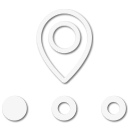PREPAREDNESS
SELF RECOVERY FAMILIARIZATION
We all at one point or another make the decision to head out and EXPLORE ON OUR OWN. Which is okay, however you still need to be LEGITIMATELY PREPARED.
You should have set in place a "notice" of sorts to your whereabouts, and when you expect to be back.
So that if something actually happens to you while in the wilderness, the proper authorities will know where to look for you in a worst case scenario.
Overland Bound has a Forum section just for that and should be taken seriously.
This link is posted below.
https://www.overlandbound.com/forums/forums/check-out-in-beta.94/
COMMUNICATIONS
Take a means of communication for areas without cell phone service. This is not only having a means of communication, but understanding what channels are being monitored for emergencies.
The SPOT Gen3 Satellite GPS Messenger is a great asset to have to reach emergency responders. It can send pre recorded text messages to your family for help, or just to let them know you are okay.
Also just in case all other means of communications have failed or are not working, have a signaling mirror! Simply by attracting someone's attention using the mirror could save your life, knowing how to signal S.O.S. is good to know as well.
NAVIGATION
If the AREA/LOCATION you are going to visit is new to you, DO YOUR RESEARCH!
Try as best you can to familiarize yourself with the area.
This should includes:
PLANNING
Think about these simple things in your planning phase before adventuring out:
You don't need to take a crazy amount of items with you for every outing! But some items are essential and should always be taken with you.
There are many factors to consider, but the one that will serve you the best is COMMON SENSE. Finding a Balance of when too much gear will inhibit your vehicles performance in emergency situations versus being under-prepared.
You should have set in place a "notice" of sorts to your whereabouts, and when you expect to be back.
So that if something actually happens to you while in the wilderness, the proper authorities will know where to look for you in a worst case scenario.
Overland Bound has a Forum section just for that and should be taken seriously.
This link is posted below.
https://www.overlandbound.com/forums/forums/check-out-in-beta.94/
COMMUNICATIONS
Take a means of communication for areas without cell phone service. This is not only having a means of communication, but understanding what channels are being monitored for emergencies.
Common Devices:
OLB Communications Channels
Please be aware and fully understand that Channel 9 on CB Radios is mandated by FCC Law as EMERGENCY USE ONLY!- CB Radio (Citizens Band)
- HAM Radio (Supposedly named after the last names of three pioneers of this radio)
- SPOT Gen3 Satellite GPS Messenger
- GMRS
- Last but not least a Signaling Mirror
- HAM: 146.460
- GMRS: 15
- CB: 16
- For more References and Guidance on this topic click the link below:
The SPOT Gen3 Satellite GPS Messenger is a great asset to have to reach emergency responders. It can send pre recorded text messages to your family for help, or just to let them know you are okay.
Also just in case all other means of communications have failed or are not working, have a signaling mirror! Simply by attracting someone's attention using the mirror could save your life, knowing how to signal S.O.S. is good to know as well.
NAVIGATION
If the AREA/LOCATION you are going to visit is new to you, DO YOUR RESEARCH!
Try as best you can to familiarize yourself with the area.
This should includes:
- Purchasing a good topographic map of the area
- Yes paper maps can be pricey, especially NAT GEO maps. To include maps offered for purchase at REI, however are very useful due to the amount of information available.
- Here is a link for NAT GEO MAPS
- Yes paper maps can be pricey, especially NAT GEO maps. To include maps offered for purchase at REI, however are very useful due to the amount of information available.
- Something as simple as downloading sections of online maps for where you will be traversing is available on Google Maps for when you loose service.
- Brad at @TrailRecon has a great YouTube Video showing how you can accomplish this. The link is listed below:
- GPS is good to have but typically does not have very detailed information for places far from populous areas. So a fantastic alternative is Gaia Maps which you can download onto most electronic devices.
Think about these simple things in your planning phase before adventuring out:
- How long will the duration of your trip be?
- How much food/water/clothes is sufficient?
- What kind of terrain will you expect where you are going?
- Is your rig capable enough?
- I.E. there are places that require:
- 4-wheel drive
- M/T tires that are snow rated
- Tire Chains
- Is your rig capable enough?
- The time of year?
- Best advice is to wear layers!
- How is the weather going to turn out for the duration of your trip?
- Not only looking before you go but while you are out is important as well.
- NOAA Weather Radio All Hazards transmitters broadcast on one of seven VHF frequencies (USA & CANADA) from 162.400 MHz to 162.550 MHz. These broadcasts cannot be heard on simple AM/FM radio receivers. Consideration of purchasing a Weather Radio should be not taken lightly. Since it could prevent unwanted mishaps due to unexpected weather during your journey.
- What activities are allowed or not allowed where you are going?
- Campfires
- Firearms
- Pets
- Off-road activity
Please visit Michael's Ultimate Overland Checklist and Corrie's Overland Trip Planner
Gear, Tools, and Supplies
You don't need to take a crazy amount of items with you for every outing! But some items are essential and should always be taken with you.
- Do you have a medical kit?
- Do you have an S.O.S. kit/Bug out bag?
- What kind of recovery gear should you take?
- Do you have containers for extra Fuel (for long trips far away from resources) and drinkable Water?
- Do you have the ability to Jumpstart/Charge your vehicle should your battery die?
- Do you have an external battery pack such as a Goal Zero?
- This is for when you are wanting to run low wattage lights, charge your phone, and other electronics when your vehicle is off so as not to drain your vehicles battery.
- Another option to consider is running a dual battery setup.
- A means of packing out what you pack in such as a Trasharoo?
- A pleasant way to keep your trash on the outside of your vehicle rather than on the inside.
- Do you have an Axe/Chainsaw and a Shovel?
- An axe/chainsaw for downed trees on trails, only do this is if you absolutely know what you are doing. (Also certain places do allow for the chopping up of "dead wood" on the ground for firewood. This is a way to save money and still practice burn it where you buy it as well.)
- There will be times when you get stuck in the dirt or sand, and a shovel will definitely help.
- Means of a shelter other than a tent, such as to provide shade and protection from the elements?
- If fires are not allowed, do you have a propane burner to retain the ability to cook food?
- Binoculars?
- Flashlights?
- Knife for utilitarian use and protection?
- Toiletries? (you never know lol even on a quick day trip you could be far away from the nearest toilet and have the need to go)
SELF RECOVERY FAMILIARIZATION
Understand that no matter how well you were paying attention, or how much experience you have driving off-road. Every once in a while you are going to get stuck, it happens to even the most experienced wheeler.
Just remember that YOU went off on a single rig exploration, and that help may not be nearby.
No matter how long you wait, help might never show up!
So with that being said:
Here are a couple things to consider, to include the familiarization of your gear:
Just remember that YOU went off on a single rig exploration, and that help may not be nearby.
No matter how long you wait, help might never show up!
So with that being said:
- Understanding your rigs limitations
- How to properly and effectively use your recovery gear
- A lack of familiarization and knowledge of your equipment could lead to:
- Damage of your Rig and Equipment
- Serious injury to yourself and anyone in harms way.
- A lack of familiarization and knowledge of your equipment could lead to:
- The use of techniques to get yourself unstuck
- There are numerous resources available online for free, and resources for a fee. (trust me paying a little to learn proper recovery skills is worth it!)
- There are recovery workshops that provide great hands on tips and training to ensure you can have a successful self-recovery.
- One great example is Overland Expo East & West, they host a plethora of training events/classes about self-recovery. Below is a link to their site:
- Understand when to air down your tires and how much. (only do this if you have a means of airing back up your tires for when you make it back to paved roads)
- 10-15% for rough terrain such as unmaintained roads and washbeds
- 15-25% for rock crawling
- 25%-50% for soft sand and dunes.
- Understand the further down in pressure you go, the greater the chance of popping the tire off the bead which holds the tire to the rim. It is highly recommended that if you intend on airing down this low to purchase a set of true bead-locking rims.
- Know and fully understand how your winch works:
- Modes of operation
- Pulling Load limitations
- In case of an electrical failure could you troubleshoot to fix it?
- Carrying a multimeter to isolate the cause of the electrical failure is key.
- How to self-recover when your winch fails
Listed below is a link to some great winch familiarization:
http://electricwinchshop.com.au/winch-safe-operation
http://electricwinchshop.com.au/winch-safe-operation
- Knowing when and how to properly use recovery boards/sand mats such as:
- Maxtrax
- Tred4x4
- Smittybilt Element Recovery Boards
- Knowledge and Proper use of a Hi-lift Jack:
- Has it been maintained?
- Proper lubrication
- Proper Stowage to protect vital parts
- No visible damage
- Understanding exactly where on your rig it can used so as not to damage your vehicle.
- Maintaining proper control of the Hi-Lift at all times to prevent in adverted droppage of your rig.
- Placing the Hi-Lift under load in such a manner where it will not fly out from under your rig potentially hurting yourself and others.
- How to use your Hi-Lift as a come-along for either when you don't have a winch, or for when your winch fails.
- Has it been maintained?
There are a lot of things to consider, but the best thing you have in your tool belt is KNOWING YOUR LIMITATIONS based on your rigs capability and your experience wheeling. If at any time you think you know everything there is to know about off-roading, you are wrong! There is always room for improvement, if you wheel often you will be placed in situations that will test you, and make you better for it!
SO GET OUT THERE AND EXPLORE BUT DO SO PREPARED!
SO GET OUT THERE AND EXPLORE BUT DO SO PREPARED!
Last edited:









